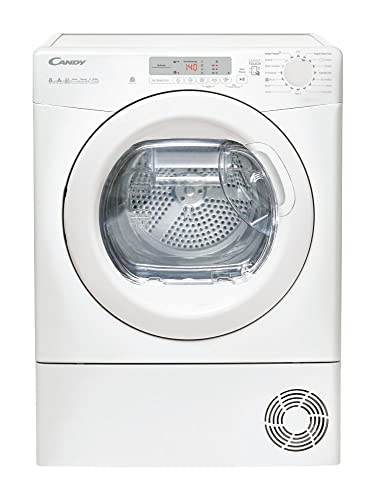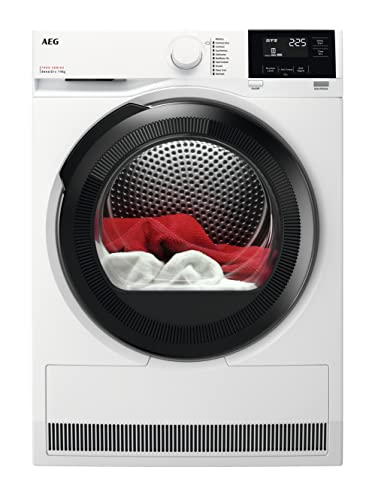20 Things You Need To Be Educated About Dryers Heat Pump
페이지 정보
작성자 Gisele 작성일24-03-02 11:32 조회8회 댓글0건관련링크
본문
 Why Buy a Dryer With a Heat Pump?
Why Buy a Dryer With a Heat Pump?Similar to standard gas or electric dryers, heat pumps warm air, and then pumps it into the drum. The warm air isn't pushed into the vents, which could lead to problems such as clogged lint filters and energy waste.
Since ventless heat pumps cool the air to remove moisture they can be placed anyplace. Learn more about their other advantages.
Energy Efficiency
They consume only less energy-intensive that traditional vented dryers use. The reason for this is because they don't need to generate their own heat like traditional dryers. Instead they rely on a closed loop refrigerant system that is similar to an air conditioner. The air that flows through the dryer's evaporator coil warms and absorbs moisture. This moisture then drips into a pan, which can be manually emptied or connected to a drainage tube. The cooled air is then circulated through the coils to start the process.
According to Energy Star, heat pump dryers use around two-thirds of electricity per load of a conventional dryer. They also do not require venting and eliminate the possibility for lint buildup in a dryer vent, reducing the risk of fire. Ventless dryers can be used in any space that has an electrical outlet. This makes them ideal for apartments and other small spaces.
In addition, the energy efficiency of a heat pump dryer translates into lower utility bills. This is especially important considering the rising cost for electricity. Heating pump dryers are typically more expensive initially however they pay for themselves in two years because of their lower operating costs.
Electric heat pump dryers use less energy as well as condensing, non-heat pumps dryers. Their cycle times are longer than conventional dryers.
If you're serious about reducing your energy use then a heat-pump dryer is the way to go. It's the most efficient method to wash your clothes and can be powered by electricity produced by solar energy or other renewable sources. If you're on the path to all-electric home and a heat pump clothes dryer should be an integral part of that home. It can be powered by the same renewable energy sources as other appliances like washers and refrigerators. In this way, Heat pump tumble it could help you meet the target of having a completely electric home by 2050.
Convenience
Many dryers that use heat Pump tumble; easy.ksubest.com, pumps come with moisture sensors that aid in preventing over drying and help save energy and time. Some dryers have anti-wrinkle technology and smart settings that are controlled by smartphone. Certain models that are ENERGY STAR certified models are able to recycle the water used to remove humidity from the air during the drying process, saving you money on disposal costs.
Heat pump dryers also provide more flexibility than vented or ducted clothes dryers because they do not require venting. This makes them ideal for a variety in the home, including basements and attics. The only drawback is that they take longer drying clothes than traditional dryers with electric motors since they don't require as much heat.
Rather than using hot air to dry clothes like conventional electric and gas dryers, heat pumps dryers reuse the same air again and again. A compressor pressurizes a refrigerant in one set of coils to release heat, and then it is pumped through an expansion valve and into another set of coils, where it cools and absorbs moisture. This cycle is repeated over and over until the load is completely dry. This is much more efficient than traditional dryers which waste energy by constantly heating air to dry laundry.
While they are green however, they can be expensive at first. They will pay for themselves over the long term by reducing your energy bill. Many manufacturers offer rebates and incentives to offset the initial cost of a dryer that uses a heater.
Some heat pump dryers require a special drain hose that is used to flush the water they use to remove moisture from the air which can increase the total cost of the device. Although this isn't a major disadvantage, it could be a deal breaker for some customers.
The heat pump dryers offer several other advantages that are worth considering. They are gentle on fabrics, helping to prolong their lifespan and look good while doing it. They are also more cost-effective and can reduce your energy costs by as much as 28% compared with conventional dryers.
Durability
These dryers reduce energy costs and prolong the life of clothing by reusing heat from air. They employ the same procedure as vented dryers to remove water from clothing, but they don't release humid air outside your home. They reuse air that has been chilled. They dry clothes more slowly than vented dryers, because they work at lower temperatures.
These dryers don't need a vent and can be placed in any area that has water and electricity. This makes them suitable for small homes, dwelling units (e.g., an apartment over the garage) and even additions. Some models are small enough to fit in tight spaces, and many can be stacked with washers to give you more flexibility. Ventless heat pump dryers with a larger capacity, and which could earn an Energy STAR certification and are more robust.
These appliances tumble clothes inside an heated drum, much as traditional vented dryers. The hot drum warms up as the clothes spin, and squeezes out the moisture. The water is then stored into a separate tank drain hose, or draining hose that has to be manually or automatically drained. Some dryers require a water tank to be drained after every few cycles. Others have a self-draining tank that requires less maintenance.
Because they're more complex than vented dryers, heat pump dryers have higher repair rates and are more expensive to maintain. These machines are nevertheless worth the investment if you are looking to save money and lower your utility costs.
Your laundry habits and budget are the two most important aspects to take into consideration when deciding whether you should buy a heat pump dryer. If you're a heavy laundry user and prefer short drying times, then traditional vented dryers are your best option. If you're looking to save money over the long term and don't care about drying times of 2.5 hours, a heat pump dryer is an excellent option. They can save you as much as $2,600 per year in energy costs and last twice as long as traditional vented models.
Noise
Heat pump dryers tend to be quieter than traditional dryers, although the noise levels vary between brands and models. Understanding the way noise is measured and the comparison of the noise ratings can help customers choose the model that is most suitable for their preferences and needs. If noise is a concern, it may be best to plan to use your dryer during times when household activities and sleep patterns are less disturbed. Additionally, locating the dryer in a location that minimizes vibration and isolating it from the floor using rubber pads or anti-vibration mats will help to reduce unwanted noise.
The grinding and squeaking sounds can be a sign of an overloaded dryer drum that is struggling to rotate correctly. To avoid this, be sure to follow the manufacturer's guidelines for load capacity and to avoid overfilling the dryer. Balancing larger items, like comforters and blankets, with a small amount of smaller items will improve performance and reduce grinding and squeaking noises during drying.
Some heat pump dryers produce a gurgling sound during the drying process. This is normal and an indication that the dryer is working according to its intended. If the sound becomes louder or continues to occur it could be an indication that the lint filter and dryer vent is blocked and needs to be cleaned.
Cleaning the lint filters regularly and dryer vents is vital to ensure a heat pump dryer that is working effectively. This will help to reduce noise during the drying process and also extend the life of the appliance.

댓글목록
등록된 댓글이 없습니다.

